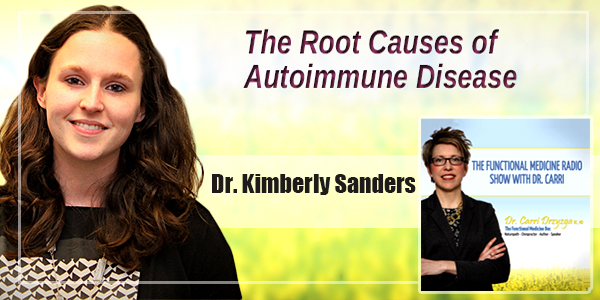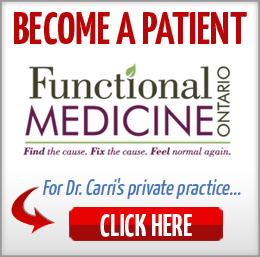Podcast: Play in new window | Download
Subscribe: Apple Podcasts | Android | RSS
In this episode of The Functional Medicine Radio Show, Dr. Carri’s special guest Dr. Kimberly Sanders explains how you can get to the root cause of autoimmune disease.
Dr. Sanders is a naturopathic doctor in Connecticut and specializes in rheumatology and autoimmunity. Her passion is finding the underlying cause of immune dysfunction and restoring balance to the immune system with functional medicine.
Main Questions Asked:
- What causes autoimmune disease?
- What are some of the infectious triggers for autoimmune disease?
- How is gut health related to autoimmune disease?
- What can be done to treat the gut in autoimmune disease?
- Can you give an example of a case from your private practice of a patient that had an autoimmune disease and how you treated them?
Key Points made by Dr. Sanders:
- Autoimmune disease is a wide spectrum of things. It can attack many different systems.
- The way I describe autoimmune disease is like when you get a virus, a cold, your immune system kicks in to attack the virus. Now imagine that your body thinks that you are a virus: your own tissues, body, heart, and joints. What would happen if your immune system got confused and started to attack yourself as though you are a virus?
- Some common examples of autoimmune diseases are the arthritis family such as rhumatoid arthritis. Also, Hashimoto’s thyroid disease and Crohn’s disease or ulcerative colitis. There are even some theories that say how autism could be an autoimmune disease meaning the immune system may be attacking the brain as though it were a foreign object.
- The causes of autoimmune disease are multi-factorial meaning that there are so many things that can happen but the current theories of autoimmune disease really point to a genetic predisposition that gets set off, or it could be some environmental trigger.
- We really try to find what these environmental triggers are and remove them as much as possible.
- For me, triggers are the fun and rewarding part because it’s different for everyone. Two people with rhumatoid arthritis may have symptoms that are almost identical but through the course of knowing the patient, their triggers are entirely different. That’s what keeps it interesting.
- The Big 5 Triggers: 1.) The gut is the most common trigger; 2.) Other infections. Not just in the gut but potential viruses lingering in the bloodstream. We know with psoriasis, strep tends to be a trigger. Children with PANDAS often have a history of strep. A flora imbalance in the mouth. Any type of cell that looks like the gut which we call mucosa but that really extends to the lung, sinuses, mouth and even vaginal. It’s really widespread; 3.) Hormone imbalance. The common example here is Hashimoto’s. It’s very often linked to high estrogen or an estrogen imbalance, it’s not in balance with progesterone. Estrogen being out of whack can also affect patients with Lupus or rhumatoid arthritis; 4.) Neurotransmitter imbalance. There’s a growing field called Neuro-Endo-Immunology. This is how the nervous system and brain chemicals are connected to the immune system. Stress, anxiety, and mood disregulation definitely go hand-in-hand with these patients who are so inflammed; 5.) Heavy metals and enviornmental toxicity. That has a lot of effects on the immune system. Things like BPA and GMO foods that we’re seeing so much more of now than ever before do play quite an integral role in the autoimmune process.
- When I talk to somebody and I’m trying to learn what their triggers are, I’m really trying to screen them then decide which of those 5 triggers are the most important at that time. Oftentimes, it’s not just one – that’s what makes it so complex.
- It’s very important for the patients to understand how the gut impacts what’s going on in the rest of the body. Specifically for autoimmune patients, they need to understnad that the immune system is primed in the digestive system.
- We have an immense amount of immune cells lining the gut and the job of those immune cells is to look at the food that you eat and make sure there are no pathogens or bugs like food poisoning. It’s there to protect you from something you may get from the environment. That’s the purpose of having an immune system so engrained in the digestive tract. It’s the first security gate to allow things into the bloodstream.
- With that understanding, it then seems to make sense that if something is wrong in your digestive system, that’s how the connection occurs with the immune system.
- Then we get into the idea of the microbiome and what’s happening with the bacteria in the gut. What it really comes down to is a certain type of immune cell called a regulatory T cell. They regulate the immune system. When the immune system is overactive such as in an autoimmune disease, the regulatory T cells’ job is to calm them down.
- Those immune cells are increased by the presence of good, friendly bacteria. Lactobacillus, the bifido group, and all of our probiotic flora increase the amount of regulatory T cells that we have in our gut.
- On the flip side, the more infections we have like yeast, parasites or an overgrowth of bad bacteria, those regulatory T cells come down in number and that allows the immune system to run rampant.
- It’s a crucial balance between healthy probiotic flora and reducing these pro-inflammatory bad bacteria that allows these regulatory immunue cells to be in good number.
- There’s also the question of leaky gut. Think of your gut lining like a really tight fence. When you eat something, it should be digested into very tiny molecules that then are allowed into the bloodstream. Now imagine the fence opening up and it’s more like a chain link fence with these big holes. Now when you eat something, it’s allowed to enter the bloodstream in a larger form. The immune system gets revved up by that. It doesn’t like large particles entering the bloodstream and it starts to attack them and when the immune system gets so revved up like that, combined with someone who has a genetic predisposition to have an autoimmune disease anyways, it sets the stage for an autoimmune disease to occur.
- The gut really is the focus for most autoimmune patients. If I can’t distinguish where to start with someone, I’ll start with the gut.
- It’s your place to go back to. It truly does control so many systems. The gut does control the brain chemicals, the neurotransmitter balance, the hormones, and it controls the toxicity in getting rid of that.
- We have stool testing for the lower intestine, breath testing to evaluate the health of the small intestine. I’ve seen a high number of patients not producing enough stomach acid. What that does is it allows food to enter the intestines undigested. That is then food for the bad bacteria so that can be a predisposing factor to why these infections come about.
- Food sensitivities and reactions are a major cause of leaky gut or at least a contributing factor. When looking for triggers, it’s important to evaluate food intolerances and some of the biggest culprits are gluten, dairy, and soy.
- The cycle has to be broken somewhere. Usually the patient has to go through a certain period where they’ll eliminate some things with the goal of healing the gut with the hopes of bringing those foods back at some point.
- Case Study: 48 year old female with rhumatoid arthritis. She had been on conventional medication for a while but didn’t feel comfortable so in conjunction with her doctor, she decided to stop and came to our clinic with the hope of finding a natural alternative.
- Main complaints: Pain in hands, feet and knees; some swelling, red, hot joints; fatigue
- During the intake, the triggers were pointing to digestive complaints she’s had her whole life: diarrhea, constipation, bloating, heartburn. She also has a significant history of anxiety and depression.
- I was most interested in the digestive and nervous systems. To look at the brain chemicals to see if the history of anxiety and depression may be impacting the immune system and possibly even the digestive complaints.
- Typically on the first visit while waiting for testing to come back, I get them started on a pretty strong anti-inflammatory protocol using different anti-inflammatory supplements and diet techniques.
- For this patient, we started with a stool test and a neurotransmitter test. She was starting to feel pretty well just on the anti-inflammatories but the stool test showed very low-levels of good flora, especially the lactobacillus family and a high level of a certain organism called Prevotella which is a virus that’s being linked more and more to rhumatoid arthritis when it’s found in the digestive system. Her neurotransmitter panel showed a little bit of an imbalance in her adrenaline markers.
- Treatment started with natural antibiotics and probiotics. It’s a little controversial but I choose to do both to eradicate that bacteria and also to enhance her good probiotic flora. Also trying to work on her adrenaline markers.
- Adrenaline is made in the adrenal gland. Low adrenaline may be linked to adrenal fatigue. It’s usually from chronic stress. I did some counseling with her to figure out where her stress is coming from and just working with her on stress management techniques like meditation, exercise, and basic things.
- She’s doing really well. Her anxiety, joint pain and digestive system are so much better. Just by eradicating this bacteria and boosting her good flora levels.
- If a patient is on conventional medication, I think the best thing to do is to use functional medicine and natural medicine very safely making sure that nothing interacts with the medications to get the person to a place where they’re feeling stable and well because when it comes to naturopathic medicine, our number one factor when we take our oath is: Do no harm. So if a patient goes off of their medication, pain will relapse for a certain period of time because you’ve removed the band-aid essentially. While that seem like a good thing to do in the long-run, the momentum starts to shift towards pain and inflammation in such a strong way that using natural medicine to stop that momentum and turn it around can be a little difficult.
- What I typically say to a patient in that case is let’s combine functional medicine, natural medicine with your prescriptions for now and get you to a place where you’re feeling great. Once you’re feeling great for a certain period of time, and that timeframe depends on the patient, then let’s have a conversation with your rheumatologist about starting to slowly cut down. That way, we’re in a bit more control of the situation and I feel like there’s a forward momentum towards healing that even though we start to pull out some medication, the body may be in such a forward motion towards getting well that it may have less of a negative impact.
Resources Mentioned:
Book – Reclaim Your Energy and Feel Normal Again
Thank you for listening! If you enjoyed this podcast, please subscribe and leave a 5-star rating and review on iTunes!








